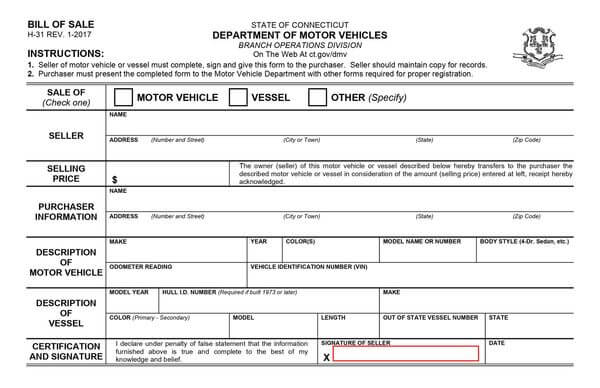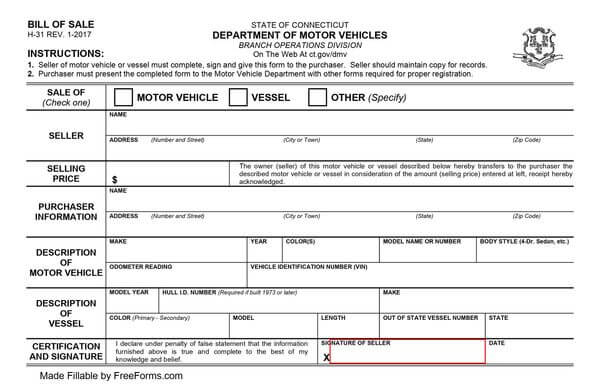In the state of Connecticut, when buying or selling a vessel or motorized vehicle, you need to have a bill of sale, also known as Form H-31. It acts as proof of a private sale and is required by the DMV when the new owner titles and registers the vehicle in their name.
There is no legal requirement for this bill of sale to be notarized.
Free Forms



Details that Must be Included on it
You can acquire Form H-31 from the online portal of the Connecticut DMV, or you can use a template of your own. In this instance, we are focusing on motor vehicles.
If creating your own bill of sale document for Connecticut, you need to include these key elements:
- The full names and addresses of both the seller and the buyer.
- The amount that the vehicle was sold for
- A description of the vehicle
It should include the following: - Make
- Year
- Color
- Model (name or number)
- The style of the body (sedan, 4 doors, etc)
- Vehicle Identification Number
- Odometer Reading
- Signatures of both the seller and buyer
- Date of sale
How to Register a Vehicle
In Connecticut, any vehicle that is used on a public road in the state is required to be registered at the DMV with the help of a bill of sale. If you are a new resident to Connecticut and are transferring a vehicle that was previously registered in another state, you have 60 days from the time you have established your residency in which to register your vehicle at the DMV. Vehicles that are registered are required to be renewed every 2 years. Owners will receive a document from the DMV to remind them of the expiration date of the vehicle’s registration.
Where to Register a Vehicle
If your vehicle is already registered, you can renew your registration online at the DMV’s self-service option. Vehicles being registered by a new owner for the first time must be done in-person at a Connecticut department of motor vehicles (DMV) location. You will need to make an appointment before visiting the DMV, which can be done through their online portal.
Once you have scheduled your appointment with a DMV office, you need to ensure that there are no issues with compliance, such as late fees and unpaid traffic tickets. This can be done online using their status with the DMV option. You will need to make sure you have all of the necessary documents including a bill of sale for Connecticut for registering and titling your vehicles. You can see a list of the required documents online.
Documents that must be brought are:
- Bill of sale in Connecticut (Form H-31)
- An odometer disclosure statement (Federal Form J-23)
- The original Certificate of Title. If this has been damaged or lost, you will need to download and complete an application for replacement certificate of title (Form H-13B)
- A valid Connecticut Driver’s License or valid ID
- If the vehicle title is an out-of-state title, you will need to have an emission check, which needs to be performed at an accredited test center
- The correct amount for the registration fees (fees may vary)
- Proof of valid insurance that has the minimum requirements:
- $25,000 to cover bodily injury per person
- $50,000 to cover bodily injury per accident
- $25,000 to cover property damage per accident
- If you are registering a vehicle on behalf of another person, you will need to download and complete a motor vehicle power of attorney
Approved Emissions Tests
As detailed in Connecticut general statutes, section 14-164c. Vehicles must be brought to and evaluated by, an appointed Connecticut emissions testing center. There are some vehicles that are exempt from needing an emissions test. You can see a list of these vehicles here.
How to Register a Vehicle from Out of State
If you are moving to Connecticut and need to register your vehicle from out of state, you will need to first establish your Connecticut residency. You will then have 60 days in which to transfer the vehicle registration to the state of Connecticut with the help of a bill of sale. This must be done in person at a DMV site. You will need to make a DMV appointment.
These are the steps that you will need to take:
Test the vehicle emissions
Have a vehicle emissions test or check the VIN of your vehicle online at the VIN verification site. Vehicles that are the model year 2017 or older will need to have an emissions test. If your vehicle is exempt from having an emissions test, you will need to have a vehicle identification number (VIN) verification. This can be done using your current registration.
In instances where the DMV is having an emissions system outage, a handwritten VIN verification (Form AE-81) that has been issued by an emissions station/inspection lane will be accepted.
Collect the required documents
Following are the documents you need before your DMV appointment:
- Accepted identification. For those transferring their out-of-state driver’s license over to a Connecticut driver’s license, this can be done when you register your vehicle.
- Proof of insurance with correct requirements.
note
Under Connecticut law, any vehicle registration that hasn’t been canceled is required to have liability insurance. For registrations that have expired, you are still required to have liability insurance on the vehicle until the license plates/registration has been canceled. It is a requirement that all insurance companies who provide auto insurance provide an insurance ID card for each vehicle that is insured, which must be carried at all times. An insurance ID card is required when registering the vehicle.
- A completed Vehicle registration form (Form H-13B)
- A vehicle inspection report, which you will be given at the time of emissions testing or VIN verification
- The correct payment for fees
- Proof of vehicle ownership in the form of the original title. If the vehicle is leased, you will need the leasing company’s original power of attorney. For vehicles that have a lien on them, you will need to contact the lienholder or the leasing company to let them know that the state of Connecticut requires an original vehicle title to register a vehicle. You can do this using this form.
Be sure to ask them to mail the documents to the Connecticut DMV at this address:
State of Connecticut
Department of Motor Vehicles
ATTN: Record Updates
60 State Street
Wethersfield, CT 06161
Once you have confirmation that the DMV has received these documents, allow 5 business days for the registration to be processed before you visit a DMV branch office.
For situations where an original title is not available, a 6-month registration can be requested. This is referred to as a “courtesy registration” and allows time for the leasing company or lienholder to provide an original title to the Connecticut DMV.
Book a DMV appointment
You can now make an appointment with a branch of the DMV. This can be done online using their appointment portal.
Conclusion
A bill of sale for Connecticut is an essential document and getting its composition as well as filing procedure right can not be emphasized enough. The right procedure and guidelines have been shared in this article.












